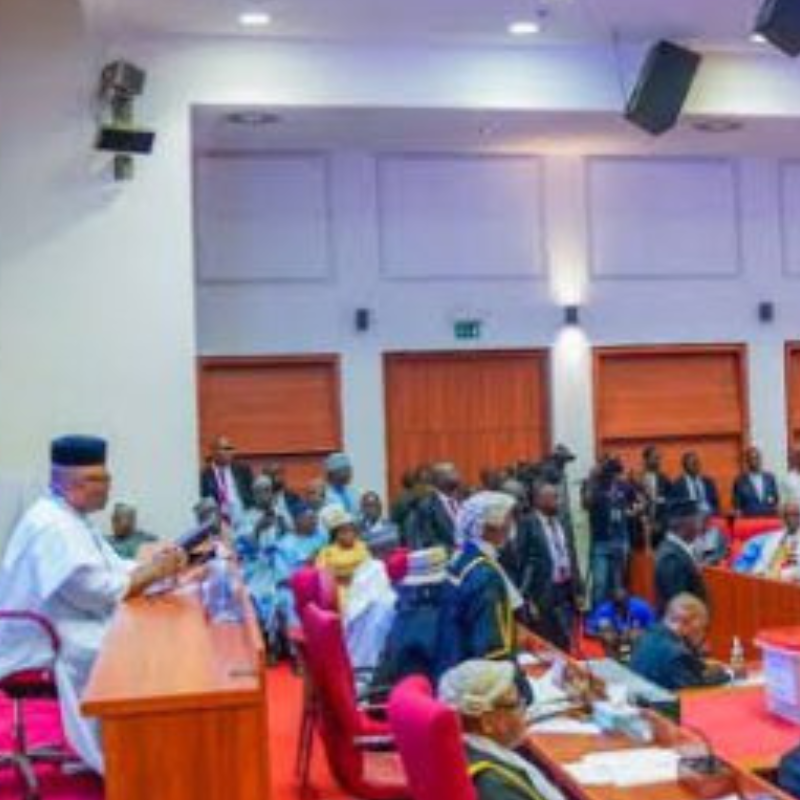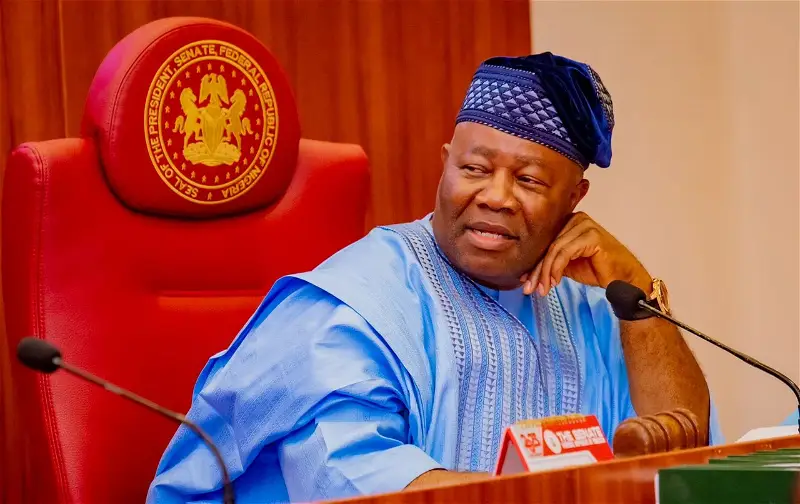The high rate of non-compliance of government agencies with legislative resolutions is brought to the fore in INEC’s stalling the conduct of by-elections while swiftly moving forward with the recall process of Sen. Natasha Akpoti-Uduaghan
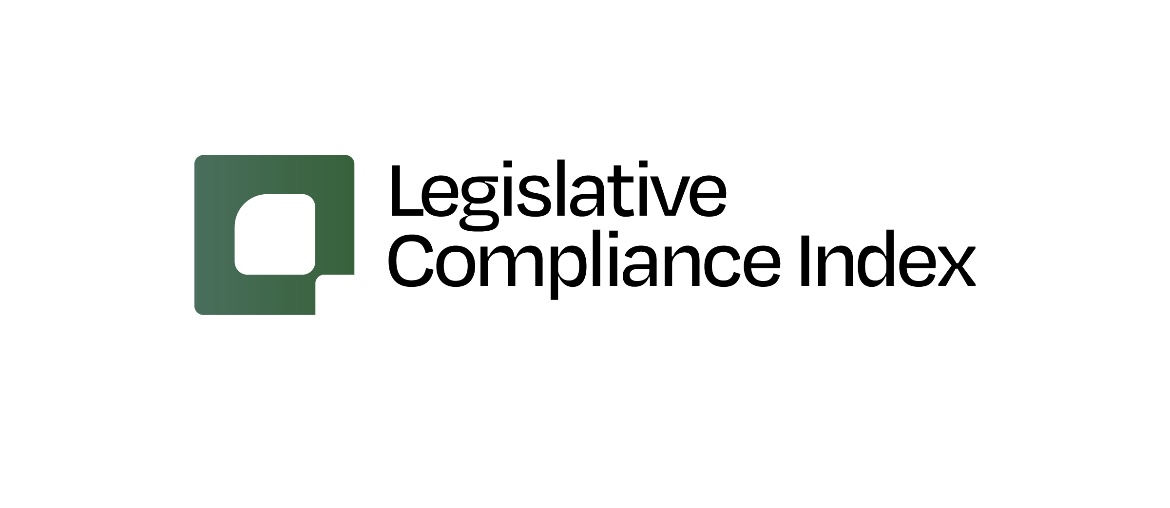
The credibility of Nigeria’s electoral process is once again under the spotlight, but this time, not because of a general election or widespread voter irregularities but for what appears to be an inconsistent approach to its responsibilities.
On one hand, Independent National Electoral Commission (INEC) has cited financial constraints as the reason for delaying several by-elections necessary to fill vacant legislative seats. On the other, it was swift to proceed with the recall process of Sen. Natasha Akpoti-Uduaghan (PDP, Kogi central).
This seeming contradiction raises unsettling questions: Are by-elections less important? Are there powerful political forces subtly pulling the strings to fast-track the removal of a vocal senator? Or is INEC selectively prioritising its resources based on external pressures rather than democratic necessity?
INEC and the by-election bottleneck
Since June 2023, Nigeria has witnessed about 23 legislative vacancies resulting from deaths or resignations of lawmakers transitioning to executive roles across government. In 2024, INEC managed to conduct nine by-elections, but about a significant number of seats remain unoccupied, posing a significant challenge for the commission.
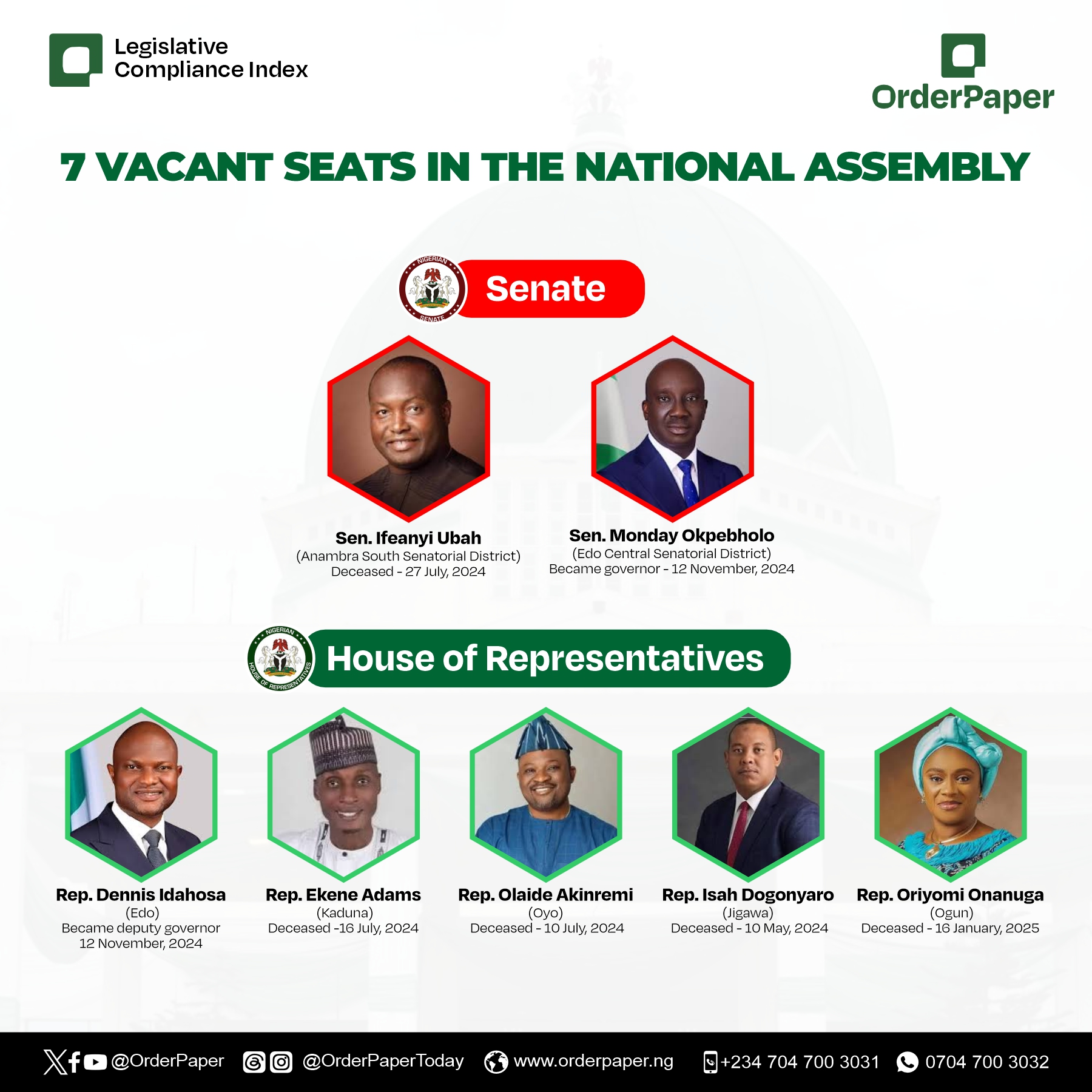
Vacant seats in the senate are:
•Anambra south senatorial district, which has lacked representation since the passing of Sen. Ifeanyi Ubah in July 2024.
•Edo central senatorial district, where Monday Okpebholo’s inauguration as Edo state governor in November 2024 left a vacuum in the senate.
Vacant seats in the House of Representatives:
Rep. Dennis Idahosa (Edo) – Inaugurated as Edo state deputy governor. Other seats were left vacant by the death of the following: Rep. Ekene Adams (Kaduna); Rep. Olaide Akinremi (Oyo); Rep. Isah Dogonyaro (Jigawa); and Rep. Oriyomi Onanuga (Ogun). The other seats are in states houses of assemblies.
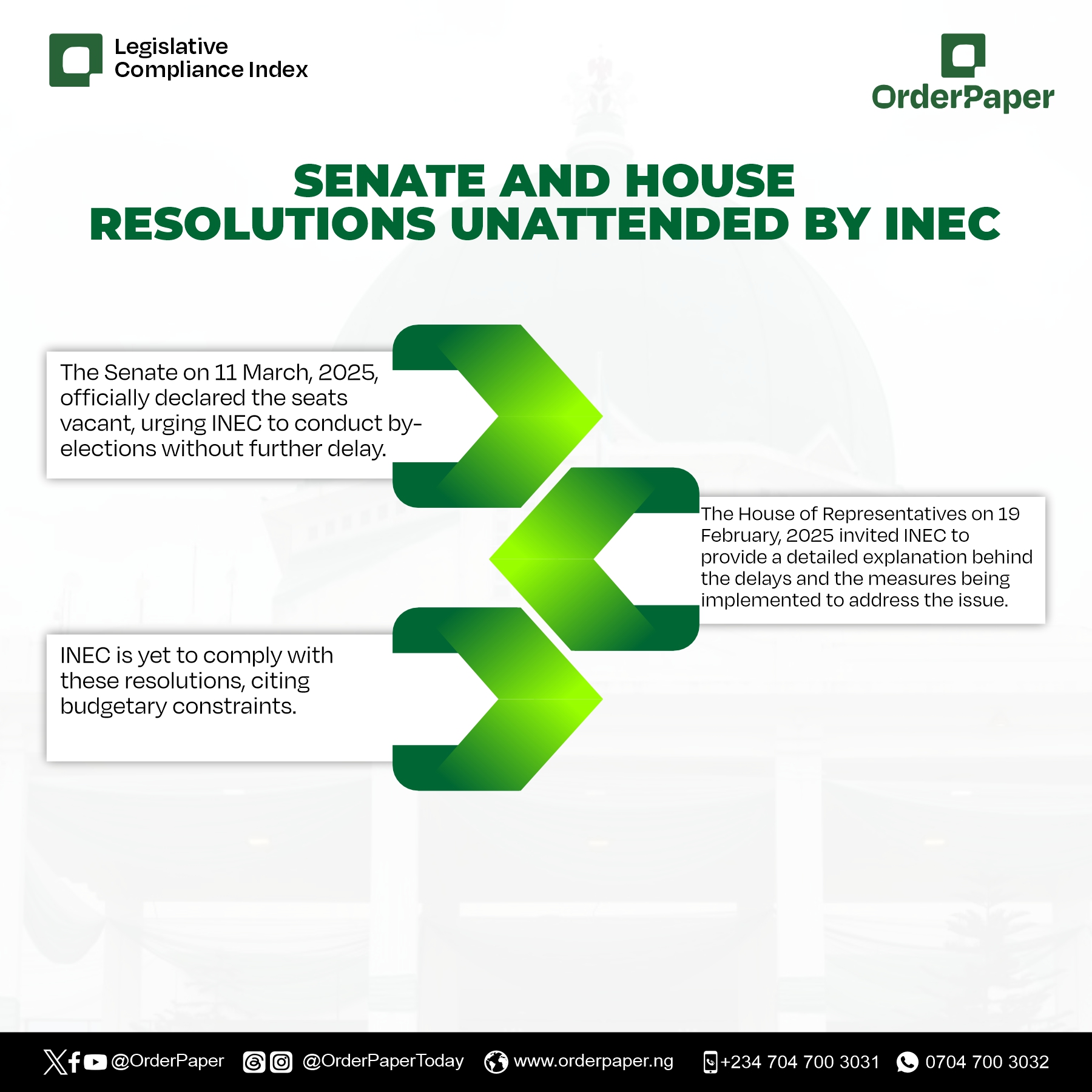
INEC and National Assembly Resolutions
On March 11, 2025, the senate officially declared two vacancies and urged INEC to conduct by-elections without delay. Similarly, the house of representatives called for elections to fill vacancies in both national and state assemblies.
It also mandated its committee on electoral matters to investigate the matter and invite the leadership of INEC to provide a detailed explanation for the reasons behind the delays and the steps taken to rectify the situation.
The commission has blamed lack of funds for the delay. Rotimi Oyekanmi, chief press secretary to the INEC chairman, emphasised that several by-elections are pending without scheduled dates due to a lack of funds. He noted that while the government provided N500 million for these by-elections, the amount remains insufficient to cover the full cost of the exercises.
This claim would have been understandable except for one glaring issue: INEC’s budget for 2025 was significantly increased, and yet, the commission still refuses to act.
INEC sets new rules for recalling lawmakers
In September 2024, INEC released updated guidelines for recalling lawmakers in the national and state assemblies, following multiple requests from constituents.
In a statement by National Commissioner Sam Olumekun, INEC clarified that the recall process must be initiated by voters, not the commission. It also reaffirmed that its role is strictly to implement recall petitions in line with the 1999 Constitution (as amended) and the Electoral Act 2022.
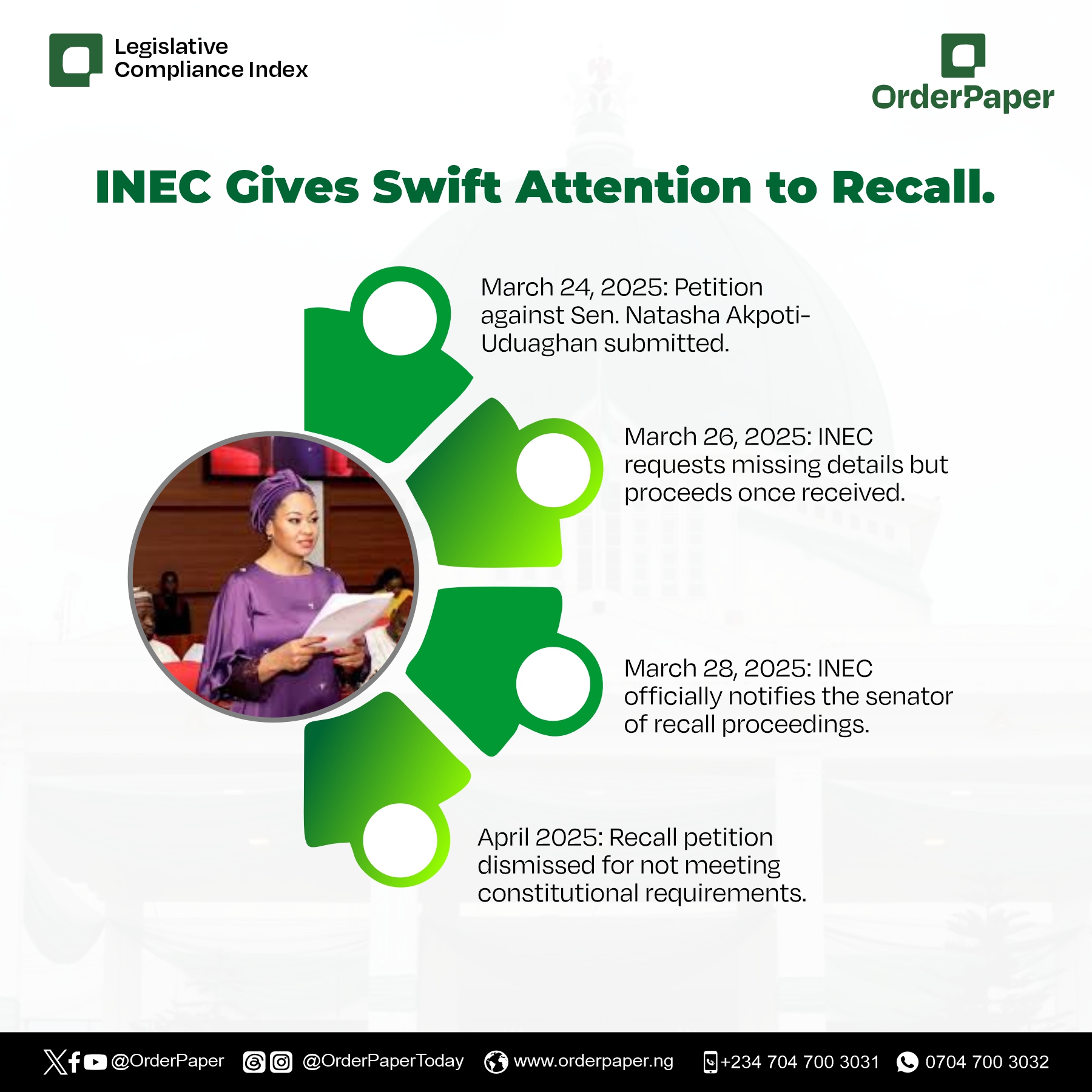
The Natasha recall petition
In a seeming contradictory development, while INEC claims it lacks the funds to conduct by-elections, it swiftly moved to process the recall petition against Sen. Natasha Akpoti-Uduaghan.
On March 24, 2025, a group identified as Concerned Kogi Youth and Women submitted the petition to INEC’s headquarters in Abuja. Initially, INEC cited the absence of contact details for the petitioners as a procedural deficiency. However, upon receiving the necessary information on March 26, 2025, the commission proceeded to notify Sen. Akpoti-Uduaghan of the recall process, as mandated by its regulations.
Despite the cost implications, the commission appeared ready to proceed.
In her response, Akpoti-Uduaghan alleged that the commission was colluding with political actors to facilitate her removal. Speaking at her homecoming rally recently, she accused INEC of coaching the petitioners to perfect their submission.
She further alleged that the petitioners, whom she identified as members of the All Progressives Congress (APC), resubmitted the petition on a letterhead under the name Kogi Central Political Frontier, with an address listed as Number 4, Oboroke.
Eventually, INEC officially dismissed the recall petition on Thursday, stating that it failed to meet the constitutional requirements outlined in Section 69(a) of the 1999 Constitution (as amended).
This decision, while favorable to Akpoti-Uduaghan, does little to erase concerns about INEC’s selective approach to electoral matters.
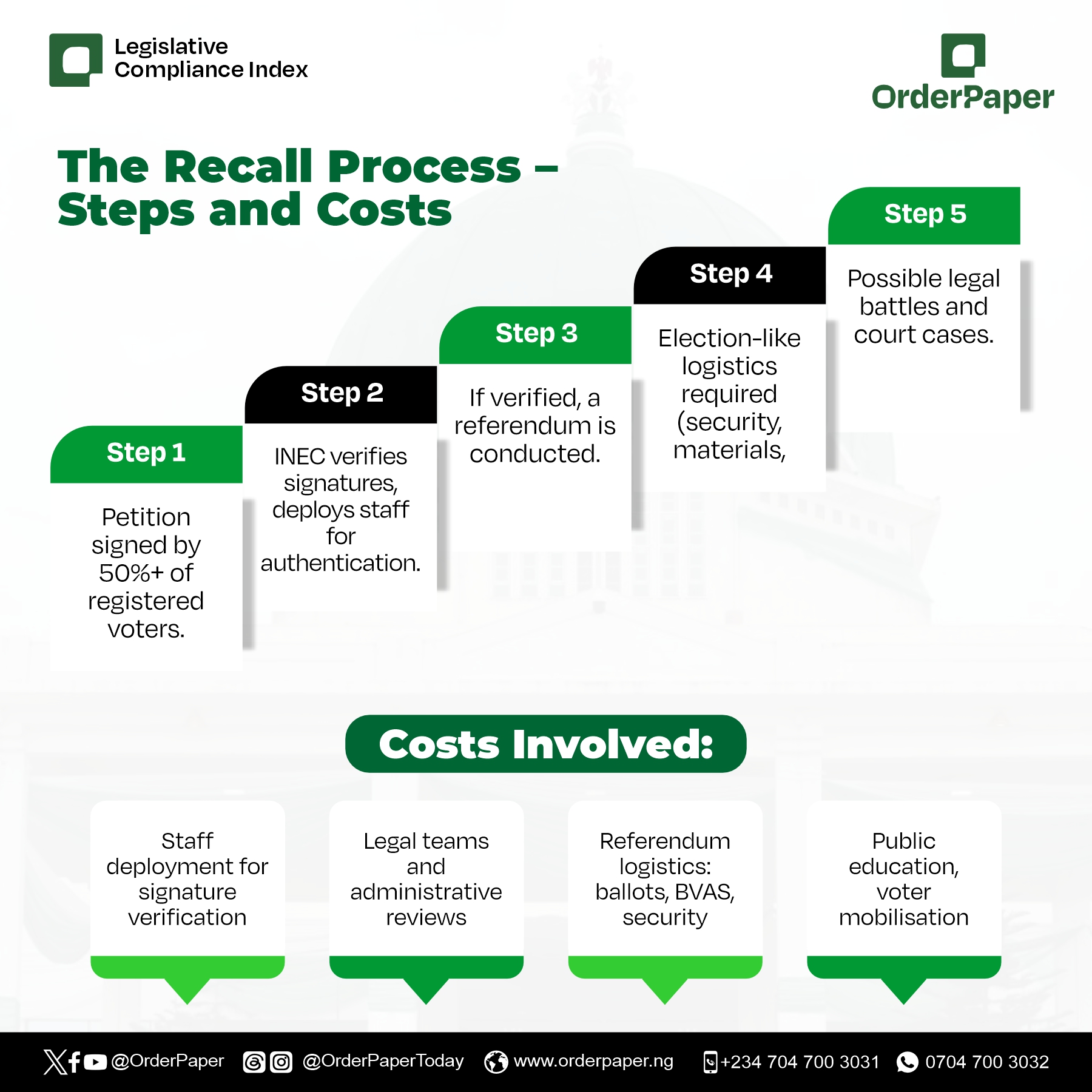
The cost of a recall
A recall process is not a simple administrative task. It involves multiple steps, each requiring significant financial and logistical commitments. First, INEC must verify that the petition is signed by more than 50 percent of the registered voters in the affected constituency.
This requires deploying officials to review and authenticate signatures. If the petition meets the legal threshold, INEC must then organise a referendum where voters decide whether to recall the lawmaker. This process is similar to conducting an election and demands logistics, materials, security, and personnel.
Additionally, INEC must engage legal teams, notify the affected lawmaker, and possibly handle court cases that may arise. However, it is important to note that a recall does not always progress to a full referendum if the petition fails verification, meaning it may not be as financially demanding as a full by-election.
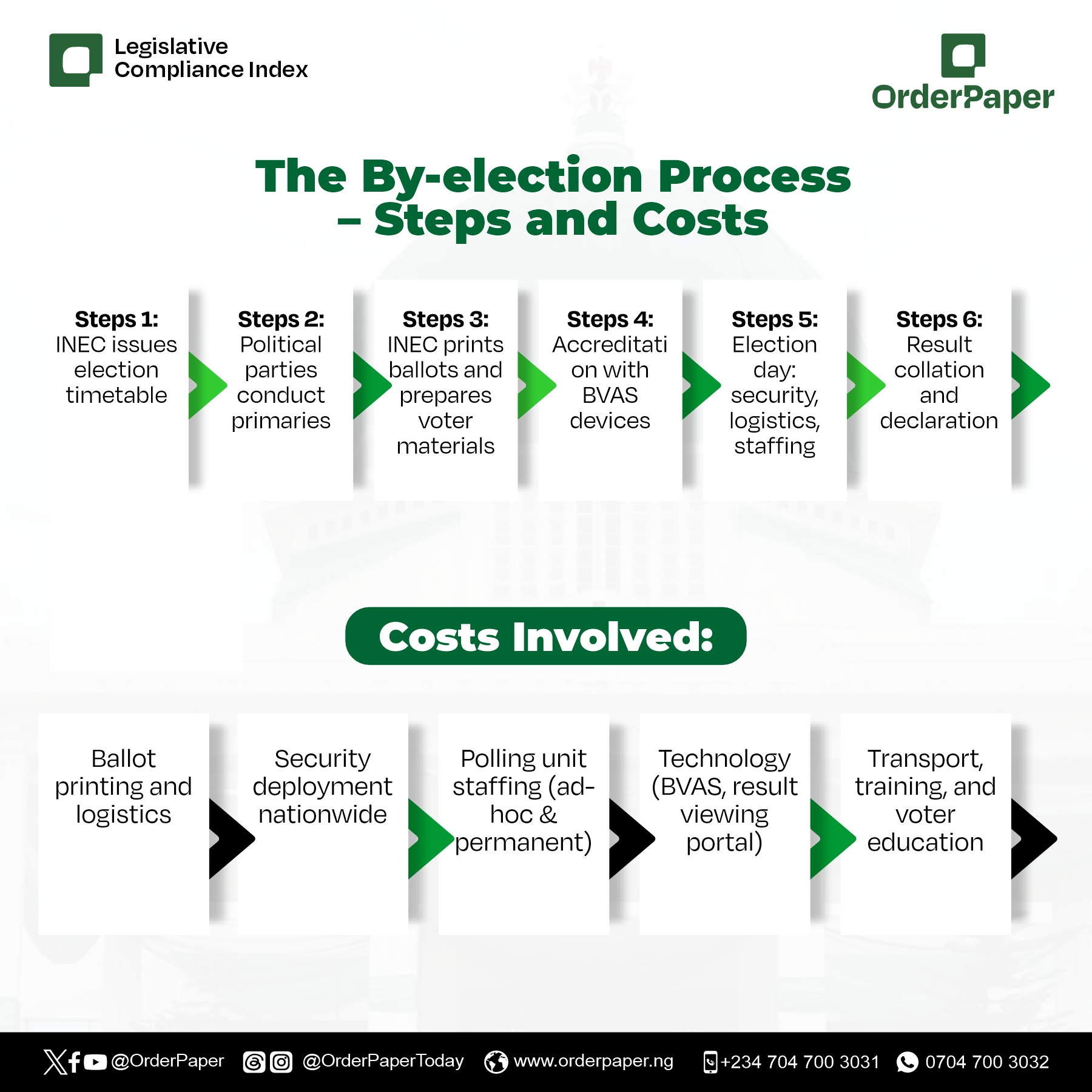
By contrast, by-elections require significantly more resources because they involve a full-scale election process. This includes ballot printing, voter accreditation, security deployment, transportation, and result collation.
INEC must also mobilise election officials and ad-hoc staff across multiple polling units, conduct voter education campaigns, and maintain election technology such as the BVAS system. Given these extensive requirements, by-elections demand a financial and logistical commitment similar to a general election.
INEC’s argument that it lacks the funds for by-elections but can still conduct a recall process does not quite add up. This raises critical questions about its priorities and possible external influence. If INEC is struggling financially, why does it appear ready to process a recall but unable to conduct elections to fill vacant seats?
Is the recall process receiving special attention because of political pressure? Does INEC have discretionary funding it is choosing to allocate selectively? These are the questions that make this situation controversial and worthy of deeper scrutiny.
By-elections are essential for representative democracy, ensuring that constituents are not left without representation due to unforeseen vacancies. The delay in conducting these elections undermines democratic principles and leaves millions without legislative representation.
Conversely, the initiation of a recall process, especially one as politically charged as that of Sen. Akpoti-Uduaghan, suggests that INEC may possess the resources to undertake certain electoral activities despite its stated financial limitations.
This discrepancy prompts inquiries into whether recalls are deemed more critical than by-elections or if other factors influence the commission’s decision-making process.
Potential political underpinnings
Sen. Akpoti-Uduaghan’s political journey has been marked by controversy. In March 2025, she accused Senate President Godswill Akpabio of sexual harassment, leading to her suspension from the senate for alleged misconduct.
The timing and nature of the recall petition against her, following closely on the heels of these events, suggest the possibility of political maneuvering aimed at her removal.
While INEC drags its feet on by-elections that would fill legislative gaps, it is quick to act on a recall process that could eliminate a vocal opponent of the senate leadership. Is this coincidence, or a deliberate political strategy?
The consequences of INEC’s inconsistency
INEC’s selective approach to electoral processes undermines public trust in Nigeria’s democracy. If the commission can be influenced to delay elections in some cases while rushing others, it raises the risk that Nigeria’s electoral system is no longer impartial.
•For voters, this means their representatives may be removed or replaced based on political calculations rather than due process.
•For democracy, this sets a dangerous precedent where INEC’s decisions are dictated not by law, but by political pressure.
•For governance, the failure to fill legislative vacancies weakens representation and decision-making at both state and national levels.
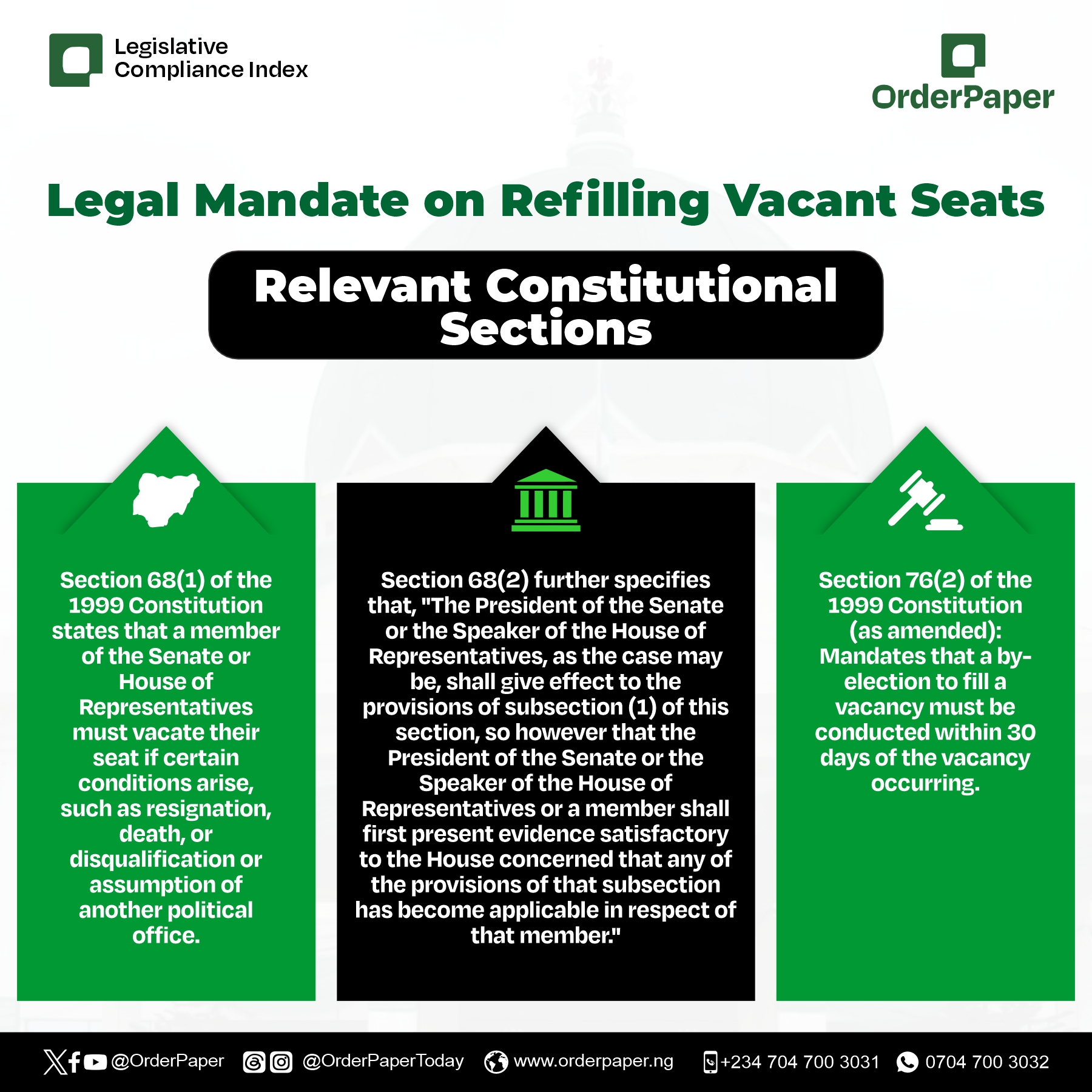
Parliament Reports made multiple attempts to get INEC’s reaction for this story but were futile as calls and text messages to the commission’s officials were not responded to.
Explainers
What is a recall petition?
A recall petition is a formal request by registered voters in a constituency to withdraw their elected representative from a legislative house. It applies to:
•Members of the National Assembly (senate and house of representatives)
•Members of a state house of assembly
•Councillors in an area council of the FCT
However, certain public officers cannot be recalled. The Chairman of an Area Council, a Governor, or the President of Nigeria can only be removed through impeachment, not recall.
What are the steps involved in recalling a legislator?
A recall process follows these legal steps:
1.Submission of a petition to the INEC chairman, signed by more than 50% of registered voters in the affected constituency.
2.INEC verifies the petition to confirm the authenticity of the signatures.
3.If the petition meets the required threshold, a referendum (a public vote) is conducted. The lawmaker is removed if the majority votes in favour of the recall.
Is recall a function of INEC?
Yes. Sections 69 and 110 of the Nigerian Constitution and Section 116 of the Electoral Act 2010 (as amended) empower INEC to conduct recall proceedings against any legislator, as long as the petition is valid and supported by at least 50% of registered voters in the affected constituency.
How long does a recall process take?
The law states that a recall process must be completed within 90 days from the date of submission of the petition.
What does INEC do when it receives a recall petition?
Upon receiving a petition, INEC:
1.Verifies if more than half of the total registered voters in the constituency signed the petition.
2.Checks compliance with the laws, regulations, and guidelines governing recall.
3.If the petition is valid, a referendum is scheduled.
What happens if a recall petition does not meet the legal requirements?
•INEC notifies the petitioners of the deficiencies.
•The petitioners may choose to resubmit the petition if they meet the legal requirements.
LEGISLATIVE COMPLIANCE INDEX (LCI): This is a governance accountability tool designed by OrderPaper Nigeria to assess the responsiveness or otherwise of public and private sector stakeholders, including MDAS, to legislative summons and resolutions stemming from both Houses of the National Assembly.


